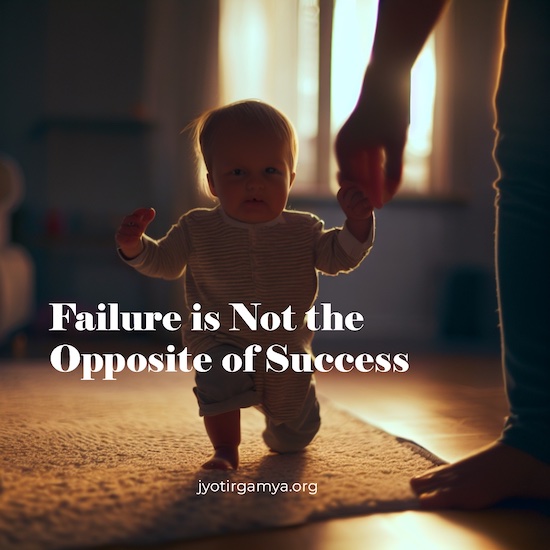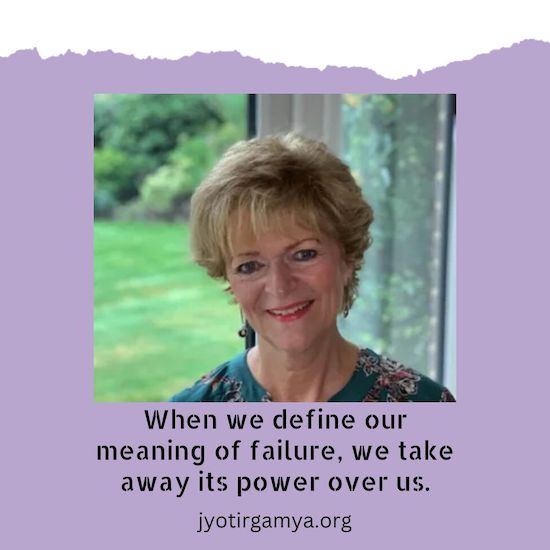Failure is Not the Opposite of Success
Introduction
Failure is a part of life, but it can be challenging for healthcare professionals. These individuals are often pressured to perform perfectly, and any mistake can have serious consequences. As a result, they may be more likely to experience negative emotions such as guilt, shame, and self-doubt when they fail.
In this article, we will explore the mental health implications of failure in healthcare. We will discuss how different personality traits and beliefs can affect how people handle failure, and we will provide some tips for healthily coping with failure.

Expert Opinion
First, we must ask, What does failure mean to me, and what is success?
The concept of failure is contextual and personal, dependent on role and perception and the critical outcome or impact of ‘not getting it right.’ The reaction, outcome, and emotional toll vary according to these elements. It is on a continuum ranging from acceptance and minor disappointment to self-deprecation, blame, and substantial emotional distress.
As a confessed mediocre cook, if I ‘fail’ to produce a great family dinner by overcooking the fish, I will forgive myself and be forgiven. It is neither critical nor life-threatening. To a top-seeded tennis player, failing to make it through the first round of a tournament might produce a different reaction.
‘Handling failure’ depends on personality traits, beliefs about responsibility, control, self-belief, and confidence. It depends on skills and ability, personal or imposed standards, the task or situation itself, and the critical outcome.
Consider our healthcare professionals working hard in a never-ending battle to provide the best possible healthcare, make good decisions, diagnose well, and use time and funds effectively.
Here is where the ‘Chronic Hero’ or ‘Imposter Syndrome’ personality traits present in many healthcare professionals take over and impede the ability to perceive and handle failure in a balanced, realistic way. Taking on the responsibility for curing the nation of all illnesses, working harder, faster, and longer trying to meet impossible perfectionist standards can only lead to ‘failure,’ the perception that it is due to their incompetence, ultimately resulting in long-term distress and burnout.
Whatever the subject matter, the art of handling failure of any kind is essentially the same:
Be accepting of mistakes and learn from them. We are all fallible human beings doing the best that we can. Forgiveness and compassion are vital to handling failure.
Know yourself, your capabilities, skills, strengths and limitations. Follow your inner Guide to decide what you can take on and what will likely push you over the edge.
Keep your boundaries in terms of demands and pressures – externally and by the pressure you put on yourself. Set realistic standards, not impossible, unachievable ones. Pay attention to your own needs rather than pushing beyond your limits. A balanced, healthy lifestyle will increase the chances of reducing stress and improving performance.
Challenge excessive beliefs about the amount of responsibility and control you have in any situation, especially if things do not go to plan, to reduce unhelpful guilt and self-blame.
Keep perspective and avoid our natural negativity bias. Accept praise when given, and note your successes far outweigh your failures.
Do not be afraid to show a vulnerability or acknowledge the need for support, coaching, or instruction. Acquiring and practicing skills can only lead to future success.
Ref: Boosting Your Mental Wellbeing using CBT and Mindfulness. Lee David and Debbie Brewin. Scion Press 2023
Conclusion
Failure is a subjective experience with many emotional and psychological consequences. How we handle failure depends on our individual beliefs, personality traits, and the context of the situation.
It is important to remember that failure is sometimes a bad thing. It can often be a valuable learning experience. When we fail, we have the opportunity to identify our weaknesses and areas for improvement. We can also learn from our mistakes and avoid making them in the future.
So, don’t beat yourself up next time you fail. Instead, focus on what you can learn from the experience and use it to become a better person.
About the Author

Debbie Brewin is a Consultant Therapist, Supervisor, and Trainer with over 20 years of experience in the mental health field. She is an accredited Cognitive Behavioural Therapist (CBT) and a British Association for Behavioural and Cognitive Psychotherapies (BABCP) member. She is also a Mental Health First Aid Instructor (MHFA).
Debbie is the Director of Mind-Growth Mastery CIC, a nonprofit community interest company providing therapy, training, coaching, and consultancy for individuals, schools, organizations, and businesses. She has worked in various settings, including the NHS, private practice, and the voluntary sector. She is particularly interested in working with anxiety, depression, and trauma.
Debbie is a skilled and experienced therapist and trainer dedicated to helping people improve their mental health.
Further Reading on Failure
Stronger at the Broken Places: The Paradoxical Impact of Failure
How to Avoid Relationship Problems
Want to stay connected? Here’s our twitter.